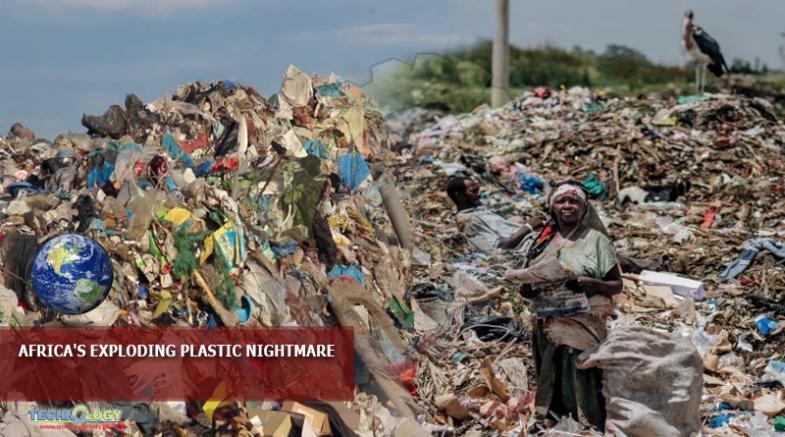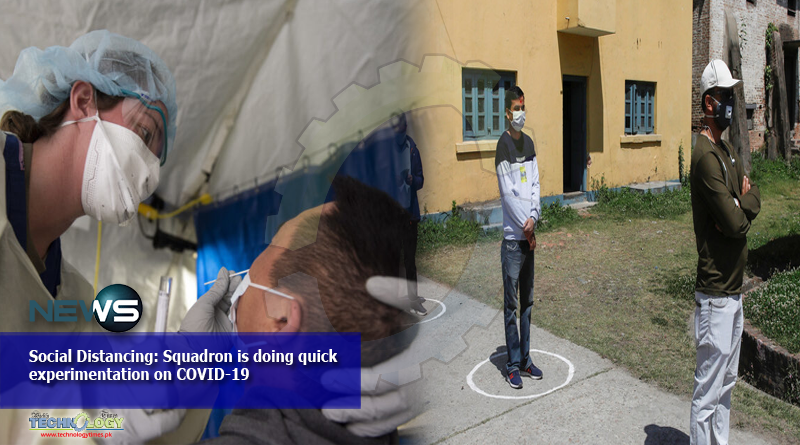ROSEMARY NYAMBURA SPENDS her weekends collecting plastic with her aunt Miriam in the Dandora dump in Nairobi. Because the bottles they sell to other plastics traders are mixed in with discarded syringes, broken glass, feces, fragments of cellphone cases, remote controls, shoe soles, trinkets, toys, pouches, clamshells, bags, and countless unrecognizable shreds of thin plastic film, the work is time-consuming and dangerous.

But Rosemary, who is 11, is hopeful that her effort will pay off. Several of her six cousins, whom she has lived with since her mother died, have already dropped out of high school because her aunt couldn’t afford their school fees. If Rosemary makes it through elementary and secondary school, and then college and medical school after that, she vows to return to Dandora. “I see how people get sick a lot here,” Rosemary said on a recent Saturday, as she stood atop a mound of rancid trash. “If I become a doctor, I would even help them for free.”
It will take a long time for Rosemary to earn enough to pay for school with her earnings from discarded plastic. Everything that’s worth anything in Dandora, which stretches for more than 30 acres in the eastern part of the Kenyan capital, is contested. Groups of local businessmen control who trades and collects waste in the dump and even charge fees to enter certain areas. Birds, cows, and goats have staked out their own grazing spots on the mounds. And waste-pickers sometimes fight over the best finds. Discarded airplane food can spark some of the fiercest fights. Whoever wins completely devours every bit of the old, dry rolls, congealed meat, and overcooked pasta, even the contents of the tiny tub of butter, before tossing the plastic packaging onto the vast piles.
Miriam Nyambura shows the cuts on her fingers from sifting through broken glass at the Dandora dump.
Photo: Khadija Farah for The Intercept
Traders who sit along the edges of the dump buy soda bottles made from PET, or polyethylene terephthalate, which Miriam gathers seven days a week, for less than 5 cents a kilogram — more than the cardboard boxes she also picks off the heaps, but far less than what they’ll pay for the same weight of metal cans. It can take many hours, even days, to collect a kilo of plastic bottles. And the bags that can fit them all, called diblas, are too big and unwieldy for children to carry.
A local youth organization, Dandora HipHop City, came up with a way for kids who live near the dump and don’t have the strength or time to gather a whole kilo of plastic to still get something for individual bottles and other pieces of plastic they gather. At the group’s “bank,” a storefront one block from the dump, kids can earn points for even a single plastic bottle, which they can then redeem for cooking oil, flour, vegetables, and other essentials. The organization, which was founded by a hip-hop artist who grew up nearby, also runs a youth program in a building on the edge of the dump. Festooned with hand-painted art and furnished with scavenged scraps that serve as chairs and sofas, the building provides a place for the kids to compose music on old computers, write, play games, and just pass the time.
But the small amount the group gets for collected plastic on the informal market doesn’t cover the food it gives out through its bank, so Dandora HipHop City has been using donations from its employees and their friends to pay for its programs. The group attempted to get a grant from Coca-Cola, which seemed like a perfect corporate sponsor. Coke, which is valued at more than $200 billion, sees Africa as “one of the core growth engines for the company going forward,” as CEO James Quincey recently put it. And the children of Dandora, who suffer from hunger, neglect, and a variety of health problems related to the dump, clean up many of the company’s bottles — sometimes gathering them when they should be in school.
Left/Top: Dandora HipHop City sits at the edge of the Dandora dump site on Feb. 15, 2020. The youth-focused, community-based organization serves as an an arts, technology, and entrepreneurship space that combats unemployment in the area. Right/Bottom: Ramsizo Burguda works on new music in the Dandora HipHop City studio.Photos: Khadija Farah for The Intercept
In September 2018, Coke brought a delegation out to the dump to meet with the youth organization. Charles Lukania, programs manager of Dandora HipHop City, says that afterward, he sent a proposal and budget to some of the Coca-Cola marketing staff who had visited outlining how the company could support its bank project. But the visit — and the proposal — didn’t lead to any funding. Instead, “they offered to give us a fridge full of Coke the kids could buy,” said Lukania, who noted that most of the children at the dump can’t afford soda. “Whatever little money they have goes to buy food.”
Later that month, the company partnered with the youth organization on several cleanup days, but those events didn’t involve any direct financial support either. Instead, Coke’s contribution toward those collaborations was Coke, the soft drink, which the volunteers were given only after they had spent hours cleaning up garbage in the hot sun. “And all the refreshments were in plastic bottles,” said Lukania.
In an emailed response to questions from The Intercept, Camilla Osborne, head of Coca-Cola’s communications for southern and eastern Africa, acknowledged that “our bottling partner Coca-Cola Beverages Africa in Kenya provided hydration and recycling bins” at one of Dandora HipHop City’s events. But, according to Osborne, “the company and its bottling partners in Kenya are not aware of a specific request for a grant from the group, and has not had any direct engagement” with Dandora HipHop City.
Osborne’s email also noted that “No one organisation alone can solve the world’s plastic problems.”
To be fair, Coke is just one of many companies that have foisted the costs of cleaning up their products and packaging onto the public. While Coke was the biggest source of plastic waste in both Africa and the world, according to a 2019 global brand audit of plastic waste, all sorts of companies that make plastic and use it for packaging have left the public to deal with the expense of addressing and preventing the harm caused by their products.
In the U.S., this externalizing of corporate costs has left municipalities shouldering the collection, carting, and processing of their plastic garbage. For decades, this burden was masked by the export of some 70 percent of the waste to China. But since China closed its doors to most U.S. plastic in 2018, some cities have found that they don’t have the money to recycle and have abandoned the practice, causing widespread inconvenience and a growing awareness of the persistence of plastic.Join Our NewsletterOriginal reporting. Fearless journalism. Delivered to you.I’m in
In poor countries, which are now bearing a disproportionate burden of the global plastics crisis, the calculus is different. While environmental outrage has constrained markets in many wealthier nations and, after the coronavirus pandemic, will likely cut further into the acceptability of plastics there, the use of plastic and products packaged in it is still growing quickly throughout Africa and elsewhere in the developing world. Meanwhile, since China’s policy change on scrap plastic, the U.S., Australia, and many European nations have been exporting their waste to other countries that are far less able to deal with it. Without the infrastructure to process the waste or the funds to fob it off on others, the plastic has swamped these nations, filling waterways, clogging roads and fields, and becoming intricately mixed into animal feed. Plastics don’t biodegrade, so the tiny shreds will remain in water, soil, and air for centuries.
While the plastics crisis has largely played out on the administrative level in the U.S., burdening local governments with the growing costs and logistics of managing plastic garbage, in developing countries that have no government-funded waste collection or recycling systems, those burdens fall on individuals. In Kenya, where some 18 million people live on less than $1.90 per day, the responsibility offloaded by some of the most profitable companies in the world falls to some of the poorest individuals in the world, like Rosemary and her aunt. And Kenya is just one of dozens of developing countries where plastic is causing massive human rights and child labor problems, in addition to environmental devastation.
Originally Publish at: https://theintercept.com/
